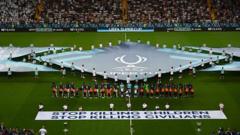Did UEFA Just Take a Stand Against Violence with a Powerful Banner at the Super Cup?

A Powerful Statement: UEFA's Pre-Match Ceremony at the Super Cup Final
In a poignant display of solidarity and awareness, UEFA's pre-match ceremony before the Super Cup final featured a powerful banner reading, "Stop killing children - Stop killing civilians." This moment unfolded at the Stadio Friuli in Udine, Italy, as players from Tottenham and Paris St-Germain lined up before kick-off. The message was more than just words; it was a call for peace and an urgent reminder of the ongoing humanitarian crises affecting children around the world.
The banner's visibility, right in front of the players, highlighted UEFA's commitment to addressing social issues amid the electrifying atmosphere of one of football's biggest events. The ceremony also included two refugee children from Gaza, Tala and Mohamed, both of whom have relocated to Milan for necessary medical treatment. Their presence underscored the personal impact of global conflicts, bringing a human face to the statistics often discussed in media reports.
The Role of Refugee Children in the Ceremony
As part of the pre-match display, nine children who are refugees from conflict zones, including Afghanistan, Iraq, Nigeria, and Ukraine, participated, further emphasizing the need for compassion in the face of adversity. This initiative serves not only as a way to recognize the struggles of these young individuals but also to promote awareness among football fans and the broader public about the plight of children affected by violence and war.
Mohamed Salah's Criticism of UEFA
The ceremony and UEFA's initiatives came under scrutiny shortly after the event. Mohamed Salah, Liverpool and Egypt forward, expressed his disappointment regarding UEFA's tribute to Palestinian footballer Suleiman al-Obeid, which he felt was insufficient. Al-Obeid, referred to as the "Pele of Palestinian football," was killed in an Israeli attack while waiting for humanitarian aid in Gaza. Salah's poignant critique, questioning the circumstances of Al-Obeid's death, highlighted the complexities and sensitivities surrounding the ongoing conflict.
UEFA's Response and Humanitarian Efforts
In response to the ongoing humanitarian crisis, UEFA has announced an expansion of its humanitarian efforts, focusing on providing support for children in Gaza. Partnering with three charities, UEFA aims to deliver essential aid to those who need it the most. This initiative reflects a growing recognition of the responsibility that sporting organizations have in addressing social and political issues, especially those affecting vulnerable populations.
Controversial Political Messages in Sports
Despite UEFA's humanitarian efforts, the organization faces challenges in balancing its political stance with its regulations. UEFA's own rules prohibit political, ideological, and religious messages at its events, and violations can result in financial penalties and other disciplinary measures. This policy raises important questions about the role of sports in social commentary and advocacy, especially in times of crisis.
The Impact of Conflict on Children
Tala, one of the children honored during the ceremony, is described as having fragile health due to the lack of medical resources in Gaza. Her journey to Milan for treatment highlights the dire circumstances faced by many children in conflict zones. Mohamed, who lost both parents in the war and suffered severe injuries from an airstrike, embodies the tragic reality many children endure in war-torn regions. These personal stories serve as powerful reminders of the impact of war on the most vulnerable members of society.
Understanding the Human Cost of War
The ongoing Israeli military offensive in Gaza, initiated in response to the Hamas-led attacks on Israel on October 7, 2023, has led to devastating consequences. Reports indicate that nearly 62,000 Palestinians have died as a result of this conflict, with countless others suffering from starvation and malnutrition. The statistics are staggering, but behind each number is a personal story of loss, pain, and survival.
The Role of Sports in Raising Awareness
Sports have always had the potential to transcend borders and bring attention to pressing social issues. UEFA's actions during the Super Cup final demonstrate the power of football as a platform to advocate for peace and humanitarian causes. By integrating messages of compassion and awareness into their events, sporting organizations can play a crucial role in shaping public discourse and fostering empathy across diverse communities.
Future Directions for UEFA and Other Sporting Bodies
As UEFA continues to navigate the complexities of sports and social responsibility, it must seek to balance its regulations with the urgent need for advocacy. The challenge lies in finding ways to express solidarity and support for humanitarian issues without violating established policies. Future initiatives could include more transparent communication about the impact of conflict on children and other vulnerable populations, as well as collaborations with organizations dedicated to humanitarian aid.
FAQs About UEFA's Humanitarian Efforts and the Super Cup Final
What was the message displayed at the UEFA Super Cup final?
The message displayed read, "Stop killing children - Stop killing civilians," aimed at raising awareness about the humanitarian crisis affecting children in conflict zones.
Who were the children involved in the medal ceremony?
The children involved were Tala, a 12-year-old Palestinian girl, and Mohamed, a 9-year-old boy, both of whom have relocated to Milan for medical treatment.
What criticism did Mohamed Salah express regarding UEFA?
Mohamed Salah criticized UEFA for their tribute to Palestinian footballer Suleiman al-Obeid, questioning the lack of information regarding the circumstances of his death.
What humanitarian efforts has UEFA announced?
UEFA announced an expansion of its humanitarian efforts, partnering with charities to provide aid for children in Gaza affected by the ongoing conflict.
What are UEFA's regulations regarding political messages?
UEFA prohibits political, ideological, and religious messages at its events, with potential financial penalties for violations of these rules.
As global conflicts continue to affect countless lives, it is crucial for organizations like UEFA to leverage their platforms for advocacy and support. The stories of children like Tala and Mohamed remind us that behind every headline lies a human tragedy that deserves attention. In a world where sports can influence change, how can we ensure that the voices of the most vulnerable are heard? #HumanRights #FootballForPeace #ChildRefugees
```Published: 2025-08-14 09:24:15 | Category: sport



